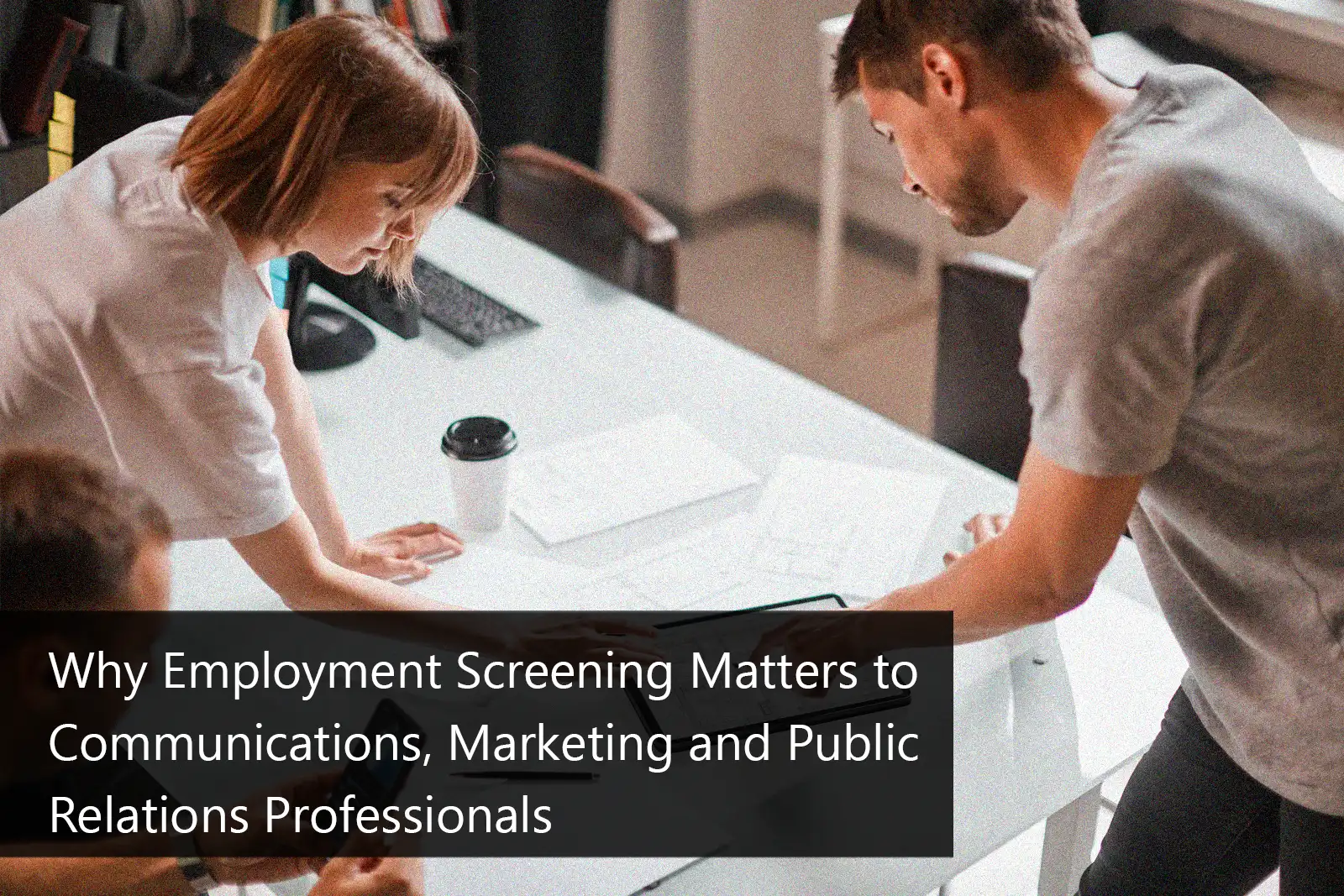Importance of Employment Screening in Communications, marketing & PR
June 11, 2022
Most professionals in the communications, marketing and public relations space never imagine inserting themselves into the inner workings of their human relations hiring processes. In a profession where years of progress on company brand and reputation can be tarnished at the speed of light, thanks to the way technology and social media connects consumers, it is critical that those charged with protecting company brand and reputation ask key questions of their colleagues before a negative story grows legs. Who works at your company, whether fully employed or working as a contractor, is as critical to maintaining a positive brand and reputation as any advertising or search engine optimization campaign you’ll ever spend money on.
When speaking with your colleagues about ways HR policies and actions can protect your brand, here are some key questions to ask:
- What kinds of screenings do we conduct on new employees and how do we determine whether to hire someone whose background screening comes back with adverse information?
When a news story hits about bad employee behavior, you want to be able to say:
A) we had no reason to believe this person was a risk; and
B) if there were any concerning behaviors after date of hire, we acted.
Key to statement A being true is ensuring that your company both background checks and does drug and alcohol screenings on new employees.
First, check with your HR leadership on whether your background screening package(s) are comprehensive. For example, are criminal convictions the only piece of information you obtain about a prospective employee? This is unlikely to be sufficient to protect the company’s brand and hard-earned reputation. If you’d want to know whether that prospective employee was sued by a victim after the statute of limitations was exhausted on a crime, you’d need to conduct a civil search. If the validity of previous employment and education is critically important (imagine a CFO without a real degree in finance or accounting), verification of education and employment as part of your background screening package is key.
Second, ask whether your company periodically update background screening on long-term employees. Wise employers obtain consent for ongoing screening during the pre-employment background screening process. This enables you to periodically rescreen employees to determine who might have been convicted of driving while under the influence or reckless operation of a vehicle since their date of hire and thus perhaps should not be driving a company vehicle.
There are many legal and equity considerations around when an employer obtains and considers adverse information about a prospective employee. For a communications professional, understanding the adverse action process and policies your company has in place can help define the level of risk the organization is taking when selecting its workforce. For some organizations, offering a second chance to those who’ve served their sentence for specific types of crimes is a successful public relations strategy. For other companies, that type of risk is intolerable. It likely isn’t in your purview to make this decision, but as a communicator knowing your company’s risk tolerance can help you shape your message and brand.
- Do we conduct screenings on our contractors? If not, do we require the company we’re contracted with to screen its employees and uphold certain standards?
As the gig economy has exploded over the last few years, employer after employer has been stung by a contractor whose actions were inconsistent with laws, ethical standards, and/or their company’s code of conduct. The first line of defense in ensuring your contractors’ presence adds value to your brand is to ensure you know who you’re in business with.
If your company is hiring individuals or very small businesses as contractors, check to make sure your HR department is conducting background checks as they would with any employee of the company. Individuals should never be asked to run and submit a background check on themselves. It is always best to have an external, neutral party running a background check and providing a compliant adverse action process.
If your company relies on larger contractors such as staffing entities or IT vendors, ask to see the contract and ensure it outlines the types of background screening the vendor must conduct before placing someone in your building or entrusting them with access to your systems and assets. When your brand is at risk, pointing the finger at a vendor that had limited contractual requirements to screen its employees won’t absolve your company of the reputational hit.
- How do we know we’re compliant with any relevant industry regulations imposed by the government? If we’re not a regulated industry, where do we look to find best practices for our industry and do we follow those best practices?
Healthcare, finance, transportation, education and energy are the most common sectors subject to federal and/or state background screening, drug & alcohol testing and sometimes other human performance, health and/or communicable disease screenings prior to the start of employment. Finding these regulations and ensuring your company is compliant within and across state lines is a critical function of HR and your compliance or risk officer.
The good news is that following regulations can be a selling point for your company. Often, compliance with regulations is a key requirement of obtaining a certification from an industry organization or passing a required audit. Transportation entities with a strong safety culture that includes hiring and retaining the safest, most accident-free operators can sell potential clients on their ability to deliver cargo and passengers safely and consistently.
As a Public Relations or Communications professional, knowing whether your company prioritizes regulatory compliance and whether safety and compliance are foundational to your brand is important. If you don’t have a large HR or compliance department, your third-party administrator of drug and alcohol testing services should be able to explain the regulations that apply to your company.
We are currently offering a free 30-minute screening program review with our compliance experts. Schedule today and we'll step through every aspect of your program and where you may be able to improve. There is no obligation or risk involved, and you'll receive a free report you can review with team members following the consultation.


